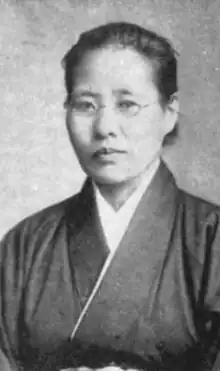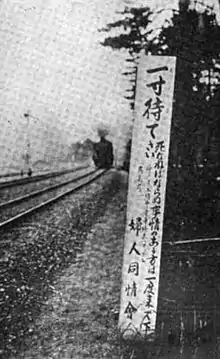Nobu Jo
Nobu Jo (城ノブ, October 18, 1872 – December 20, 1959) was a Japanese Christian philanthropist, based in Kobe. She was head of the Kobe Woman's Welfare Association, and gained international attention in the 1920s for her suicide prevention campaign of signage and personal intervention.
Nobu Jo | |
|---|---|
 Nobu Jo, from a 1923 publication. | |
| Born | October 18, 1872 |
| Died | December 20, 1959 |
| Nationality | Japanese |
| Occupation | philanthropist |
Early life
Nobu Jo was born in Ehime prefecture on October 18, 1872.[1] She was the daughter of a doctor.[2] She was educated at a Christian mission school in Matsuyama.[3]

Career
Jo was founder and head of the Kobe Woman's Welfare Association (Kobe Fujin Dojokai). She was known for her suicide prevention campaign.[4][5] Beginning in 1916 near Suma,[6][7] she placed large, well-lit signs in high-risk places, including train stations and bridges. The signs advised suicidal visitors to stop, to wait, and to visit Jo's home or office, if they were experiencing despair. Jo believed that many suicidal people in the city experienced stress, poor health, poverty, and social isolation, and that these underlying issues might be resolved or relieved without loss of life. She received letters thanking her for the signage, and was credited with saving thousands of lives.[7][8]
Jo and her organization also started a kindergarten, and assisted domestic violence survivors. She sheltered hundreds of women from abuse in a Kobe residence she established for the purpose, and once telling an angry man with a knife, "You may have your wife back just as soon as you become a decent man and deserve her."[3] She helped women arrange education, employment, housing, travel, and childcare, but also offered spiritual guidance and counseling.[8][9] "Her efforts are untiring, her sympathies wide, her methods effectual, as she carries on her work of saving women from suicide", declared an Australian newspaper in 1936.[4] Her work continued through World War II and into the postwar era, even adding a retirement home for older women.[10][11] Jo grew deaf with age, was injured in a fire during the war, and was described as "frail" and "lame" by visitors in her later years.[12][13]
References
- 20世紀日本人名事典,367日誕生日大事典. "城 ノブ(ジョウ ノブ)とは". コトバンク (in Japanese). Retrieved 2019-11-09.
- "母たちの母 城 ノブ①洗礼に父は激怒、「勘当」|福祉新聞". 福祉新聞 (in Japanese). Retrieved 2019-11-09.
- DeForest, Charlotte Burgis (1923). The Woman and the Leaven in Japan. Central Committee on the United Study of Foreign Missions. pp. 188, 198–199.
Nobu Jo.
- "Suicide in Japan; A Woman's Efforts to Stamp it Out". Cairns Post. May 25, 1936. p. 9. Retrieved November 9, 2019 – via Trove.
- Clarke, Francis W. (July 18, 1929). "The Orient Through the Eyes of an Atlanta Newspaper Man: Suicides and Nobu Jo". The Atlanta Constitution. p. 8. Retrieved November 9, 2019 – via Newspapers.com.
- "母たちの母 城 ノブ⑤自殺防止に「一寸待て」|福祉新聞". 福祉新聞 (in Japanese). Retrieved 2019-11-09.
- "A Signboard for Suicides in Japan". The Missionary Review. April 1921. pp. 308–310. Retrieved November 8, 2019.
- Matthews, Herbert L. (July 7, 1929). "Woman's Signs Save Many From Suicide; Mrs. Nobu Jo's Placards Urge Desperate Japanese to Come to Her for Help". The New York Times. p. 48. Retrieved November 9, 2019.
- Slate, Anna Blanche (February 1924). "Historic 221 Bluff and our Training School". Woman's Missionary Friend. 56: 41.
- "Woman, 80, is Honored for Service in Japan". The Mercury. February 13, 1954. p. 6. Retrieved November 9, 2019 – via Newspapers.com.
- "母たちの母 城 ノブ⑦孤児、未亡人救済に全力|福祉新聞". 福祉新聞 (in Japanese). Retrieved 2019-11-09.
- "Wonderful Work of Devout Woman". The Montgomery Advertiser. November 24, 1946. p. 35. Retrieved November 9, 2019 – via Newspapers.com.
- Jones, E. Stanley (March 17, 1955). "Growing Spiritually: Noble Jo". The Daily Chronicle. p. 4. Retrieved November 9, 2019 – via Newspapers.com.
- "母たちの母 城 ノブ②"運命の人"との出会い|福祉新聞". 福祉新聞 (in Japanese). Retrieved 2019-11-09.
External links
- A photograph of an elderly Nobu Jo with one of her signs, surrounded by younger women and children, from the Kjeld Duits Collection, MeijiShowa.